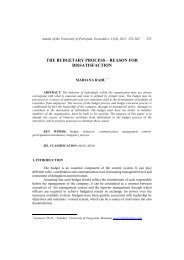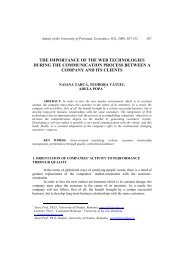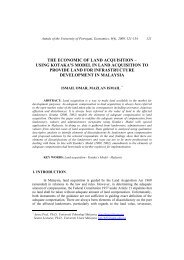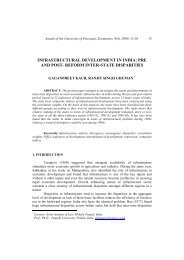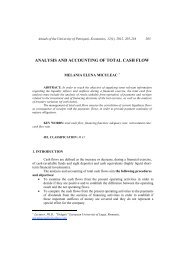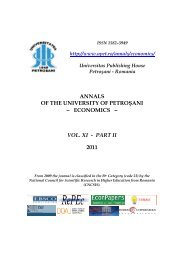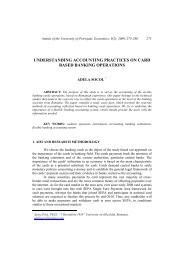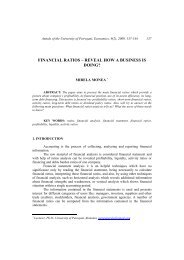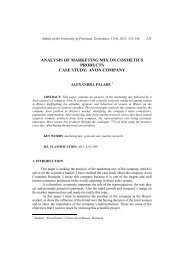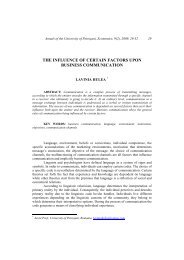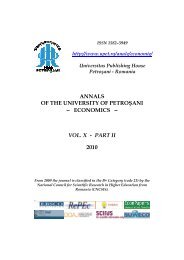annals of the university of petroÅani â¼ economics â¼ vol. xi - part i ...
annals of the university of petroÅani â¼ economics â¼ vol. xi - part i ...
annals of the university of petroÅani â¼ economics â¼ vol. xi - part i ...
Create successful ePaper yourself
Turn your PDF publications into a flip-book with our unique Google optimized e-Paper software.
Integration process in management science - <strong>the</strong>oretical review 75<br />
Predominant concept applied in science was to investigate phenomena in<br />
eliminating conditions, separating phenomena from <strong>the</strong>ir environment. The goal <strong>of</strong> this<br />
approach was to find a “simple” description <strong>of</strong> <strong>the</strong> investigated phenomenon, most<br />
frequently by using a model or a ma<strong>the</strong>matical formula. It was not earlier than in <strong>the</strong><br />
20 th century that a concept arose according to which complicated phenomena and<br />
complex objects cannot be analyzed <strong>part</strong>ially and reduced to simple (<strong>part</strong>ial) chains <strong>of</strong><br />
cause and effect. A natural scientist Ludwig von Bertalamffy is widely considered as<br />
fa<strong>the</strong>r <strong>of</strong> a new approach in sciences. According to him, all kinds <strong>of</strong> phenomena should<br />
be investigated as mutually interacting systems not only inside <strong>the</strong>m but also in relation<br />
to <strong>the</strong>ir environment. Toge<strong>the</strong>r with an economist Kenneth Boulding <strong>the</strong>y founded<br />
(1954) a scientific society named Society for General Systems Theory (later renamed<br />
into Society for General Systems Research) (The System Approach to Societal<br />
Problems, 1982). According to those researchers <strong>the</strong> general goal <strong>of</strong> systems research<br />
is to create <strong>the</strong>oretical concepts and tools for interdisciplinary research.<br />
Interest in systems research resulted in large <strong>part</strong> from a development <strong>of</strong><br />
analysis and interdisciplinary studies started during World War II aiming at finding<br />
solutions to military problems. System analysis is an example <strong>of</strong> coming back to a<br />
holistic vision <strong>of</strong> <strong>the</strong> world, a concept known already in <strong>the</strong> Antiquity 11 . At present it<br />
has became more visibly present in many research concepts 12 . Particularly one element<br />
<strong>of</strong> reality which is economy requires a holistic approach taking into account its<br />
comple<strong>xi</strong>ty and impossibility to methodologically reduce its phenomena.<br />
The system approach based on a postulate <strong>of</strong> Society for General Systems<br />
Research is one <strong>of</strong> <strong>the</strong> most distinctive features <strong>of</strong> development <strong>of</strong> sciences concerned<br />
with organization and management in <strong>the</strong> second half <strong>of</strong> <strong>the</strong> 20 th century (Koźmiński &<br />
Piotrowski, 1998). The integrative importance <strong>of</strong> <strong>the</strong> system approach is based on a<br />
postulate <strong>of</strong> a complex approach towards objects treated as open systems that is<br />
interacting with <strong>the</strong> environment. Simultaneously, aiming at integration <strong>of</strong> various<br />
concepts through fighting interdisciplinary obstacles as well as using analogies and<br />
similarities to construct models (Pachura, 1992) can be observed According to some<br />
researches <strong>the</strong> system approach “will gradually lead to integration <strong>of</strong> all o<strong>the</strong>r<br />
approaches in <strong>the</strong> <strong>the</strong>ory <strong>of</strong> management” (Stoner & Wankel, 1992, p.66).<br />
Management by objectives is considered to be one <strong>of</strong> practical methods <strong>of</strong><br />
representative management in case <strong>of</strong> <strong>the</strong> system view (Koźmiński & Piotrowski,<br />
1998).<br />
Development <strong>of</strong> <strong>the</strong> system <strong>the</strong>ory through analysis <strong>of</strong> interactions <strong>of</strong> systems<br />
with <strong>the</strong>ir environments and a growing role <strong>of</strong> <strong>the</strong> environment, influenced a<br />
development <strong>of</strong> ano<strong>the</strong>r stream in modern management namely situational approach.<br />
This trend concentrates on a special approach towards problems <strong>of</strong> organization and<br />
management based on analysis <strong>of</strong> specific practical cases in relation to a changing<br />
dynamics <strong>of</strong> <strong>the</strong> environment. This approach stresses and “e<strong>xi</strong>stence <strong>of</strong> relations<br />
between <strong>part</strong>s <strong>of</strong> an organization” (Krzyżanowski, 1999) and analyzes which <strong>of</strong> those<br />
relations are <strong>of</strong> primary importance for a specific goal or problem. R. Griffin states that<br />
11 Aristotle and a ma<strong>xi</strong>m attributed to him “a whole is more than <strong>the</strong> sum <strong>of</strong> its <strong>part</strong>s”<br />
12 its sign may be a growth in interdisciplinary research



